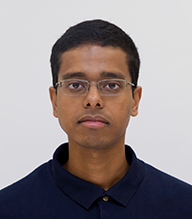Implantable Neural Recording Front-Ends for Closed-Loop Neuromodulation Systems

Speaker: Hariprasad Chandrakumar
Affiliation: Ph.D. Candidate - UCLA
Abstract: Neural recordings are indispensable for understanding brain function, in diagnosing neurological conditions, and for advanced prosthesis to aid paralyzed patients. However, neural stimulation is necessary to administer therapy in patients suffering from neurological ailments that do not respond to conventional treatment. Modern neuroscience requires a miniaturized, implantable system that can record neural signals from several channels during stimulation. To ensure patient safety and compliance with FDA regulations, the neural recording system faces a unique set of design challenges. Specific challenges include realizing very-low-frequency filtering, ensuring high input-impedance and achieving a large dynamic-range to tolerate stimulation artifacts. The current state-of-the-art has severely limited performance, hence a new recording system is proposed that enables neural sensing during stimulation on an implant scale.
The proposed neural recording front-end consists of an 8x-gain low-noise chopper amplifier that interfaces with the recording electrodes, followed by a power-efficient 15.2b-ENOB sigma-delta ADC. The first part of this talk will discuss the design challenges encountered in the neural recording chopper amplifier. New techniques have been proposed that enable the amplifier to achieve a high DC input-impedance, large linear-input-range, increased tolerance to large common-mode interferers, and realize electrode-offset filtering in a small chip area. The second part of this talk focuses on the design of the sigma-delta ADC. New techniques to reduce power consumption and improve the linearity of the ADC are proposed, which enable us to realize the most power-efficient ADC reported to date. Finally, the performance of the complete recording front-end is presented. Compared to the state-of-the-art, we achieve 24x higher DC input-impedance, 2x higher linear input-range, 10x higher signal bandwidth, >12.6dB higher dynamic range and 3.5x higher tolerance to common-mode interferers. The prototype of the front-end was fabricated in 40-nm CMOS to verify our claims.
Biography: Hariprasad Chandrakumar is a Ph.D. candidate in the Department of Electrical and Computer Engineering at UCLA. His research interests include analog, mixed-signal and RF circuits, and their applications to develop solutions for biomedical data acquisition systems. For his doctoral research, he is working on an implantable high-dynamic-range neural recording system that is capable of recording neural signals in the presence of large stimulation artifacts. He has held internship positions at Texas Instruments and Broadcom, where he worked on analog filters and amplifiers for wireless applications. He received the Outstanding Student Designer Award from Analog Devices in 2013, the Henry Samueli Excellence in Teaching Award from UCLA in 2013, the Broadcom Foundation Fellowship for 2016-17, the Dissertation Year Fellowship from UCLA for 2016-17, and the Pre-Doctoral Achievement Award from the IEEE Solid-State Circuits Society in 2017. Hari received the B.E. degree from the Birla Institute of Technology and Science (BITS) Pilani, India, in 2010, and the M.S. degree from UCLA in 2012, both in Electrical Engineering.
For more information, contact Dejan Markovic (dejan@ee.ucla.edu)
Date/Time:
Date(s) - Oct 19, 2017
1:00 pm - 3:00 pm
Location:
E-IV Tesla Room #53-125
420 Westwood Plaza - 5th Flr., Los Angeles CA 90095
